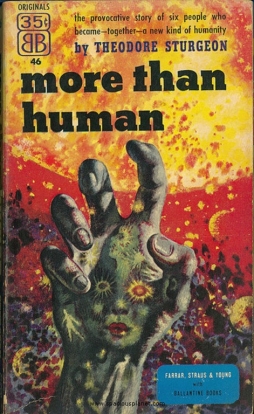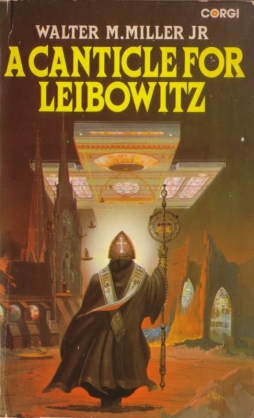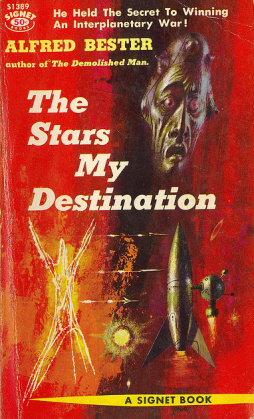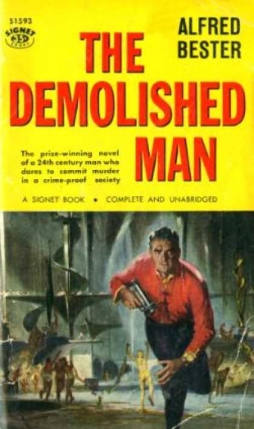Triptych, by J.M. Frey: A Review
 Triptych
Triptych
J.M. Frey
Dragon Moon Press (286 pp, $19.95, March 2011)
Science fiction typically makes certain assumptions about alien races. For example, that they use language in ways we understand. Or, that they imagine gender and sex in ways familiar to us. The second is a far more unlikely assumption; language, or communication more broadly, is something one would expect to develop in intelligent species, and in a way defines for humans what intelligence is. But sex necessarily is a thing of the body, and so will vary with the composition of the body. An alien body won’t have human sexual responses.
J.M. Frey’s novel Triptych tries to tell a story with that awareness in mind. I’m not entirely convinced by the book, but I think it’s effective overall. Both its flaws and virtues seem to me to follow from specific genre traditions, with the result that it feels oddly like an old-fashioned science fiction novel that happens to have some twenty-first-century attitudes about sexuality.
A triptych is a work of art, typically a painting, in three parts. Usually the central part is the most prominent. That’s essentially the structure of the novel: three parts, plus a prologue and epilogue. The prologue sets up a near-future world in which alien refugees have come to earth. Their integration into human society comes through working with a multinational organization called the Institute, physicists and linguists and other specialists, all given military training. The first part of the story proper then skips back to 1983, setting up a time travel plot. The second part gives us the tale of one of the alien refugees, up to the point where the prologue begins. The third part, and the epilogue, wrap up the plot and solve the remaining mysteries. And through all these sections, the book is actually telling a love story, or at least the story of an unconventional relationship: another triptych, a polyamorous love between an alien and two humans.
 Structurally, the book’s quite elegant. Time travel can be a tough thing to pull off without being overcomplex or overfacile. On the one hand, plot twists risk being too obvious too early; on the other hand, attempts to follow the logic of non-sequential time often result in the narrative getting too complex. I think Frey finds a nice balance. In fact, I’d say that she uses time travel in a clever structural way, opening the book in medias res (the prologue) before skipping back (in parts one and two) — effectively putting the reader in the perspective of a time traveller, knowing something’s going to happen, knowing a bit of the world to come, but unsure of how exactly it all comes about. At points the book rises near the level of classical tragedy, where you’re both aware of the shape of the story and at the same time not thinking about it as you follow what unfolds before you in the moment, watching the story build to the inevitable terrible catharsis you try not to remember is coming.
Structurally, the book’s quite elegant. Time travel can be a tough thing to pull off without being overcomplex or overfacile. On the one hand, plot twists risk being too obvious too early; on the other hand, attempts to follow the logic of non-sequential time often result in the narrative getting too complex. I think Frey finds a nice balance. In fact, I’d say that she uses time travel in a clever structural way, opening the book in medias res (the prologue) before skipping back (in parts one and two) — effectively putting the reader in the perspective of a time traveller, knowing something’s going to happen, knowing a bit of the world to come, but unsure of how exactly it all comes about. At points the book rises near the level of classical tragedy, where you’re both aware of the shape of the story and at the same time not thinking about it as you follow what unfolds before you in the moment, watching the story build to the inevitable terrible catharsis you try not to remember is coming.
Unfortunately, that tragic moment happens a bit too early in the book. Most of the third part, and the epilogue, seems aimless. The plot is wrapped up, but the emotional intensity’s fallen away considerably. There’s a bit of a whodunnit aspect, but that’s both mechanical and obvious — the revelation of who’s behind events is clear if you’ve been paying attention, and the way it’s presented as a revelation, the way the mystery-plot element’s played up, seems out of tune with the way the book otherwise tries to focus on character.
The story shifts point-of-view for each section, and generally makes strong choices about which character should be the focus when. That is, the dramatic action of each part fits the character we’re following, with the whole cohering nicely. The style shifts just enough to give each character a distinct feel while still maintaining a sense of consistency. Frey uses different techniques to emphasise aspects of character — writing in the present tense in one section, for example, while in another she uses single words in parentheses to bring out subtext: “Evvie wanted nothing (everything) to do with her misery.” It’s an interesting way of bringing out alternate readings, but I’m not sure it works; I can’t help but feel subtext is often more powerful when it either remains as subtext or is worked more naturally into the fabric of the work. Still, the presence of tics like this help to signal the book’s ambitions, an attempt to do something a little different, linguistically and otherwise.
 I’d say the language as a whole mostly focuses on clarity over complexity, though I found the action scenes tended to be confusing due to a lack of grounding in physical detail; at those moments the focus on character tended to obscure the actual events. That’s not always necessarily a bad thing, but occasionally it seemed to me to be overly unclear what a character was actually reacting to.
I’d say the language as a whole mostly focuses on clarity over complexity, though I found the action scenes tended to be confusing due to a lack of grounding in physical detail; at those moments the focus on character tended to obscure the actual events. That’s not always necessarily a bad thing, but occasionally it seemed to me to be overly unclear what a character was actually reacting to.
Frey’s main human characters are traditional sf protagonists: scientists as heroes. Social outcasts, geeks, made good. Her villains are know-nothings; people opposed to the presence of aliens and to their integration on Earth — the racist and the hateful. Which is to say that Frey’s themes feel like traditional liberal humanist themes, something out of Theodore Sturgeon, say. The coming together of diverse folk, and the overcoming of hatred by learning. It does feel a bit simplistic, though; characters either begin as open-minded or easily become so, and rarely seem to resent having their errors and assumptions pointed out. The book would’ve been more challenging if it’d given the point-of-view of an unreconstructed xenophobe.
That humanistic thematic approach, though, harmonises with the overall sense of the book. The book felt to me like science fiction of the 1950s; post-Campbell, pre-New Wave. When writers were reacting to, and against, the consensus future of interstellar colonisation and ongoing progress. When new structural and stylistic techniques were used, but not as intensely as you’d find in the New Wave writers. So in a way Frey’s kind of linguistic games recalls Alfred Bester playing about with the placement of words on the page — modernist language use embedded in a straight-ahead narrative — and the triptych structure’s vaguely reminscent of something like A Canticle For Leibowitz, or maybe Sturgeon’s More Than Human, a holdover from a time when novels were assembled out of novellas. I’m not saying this book’s as good as those, but I feel it’s strongly in that tradition, and the humanist tradition I find in that era of science fiction (admittedly, not necessarily in Canticle).
 Conversely, the humanism of the book comes through the depiction of the experience of an alien. Specifically, the experience of the tall, humanoid, furry alien named Kalp, the character we follow through the second part of the novel. Kalp is assigned by the Institute to work alongside two humans, Gwen and Basil, a couple. Kalp, with minimal experience of human ways, learns from them, comes to live with them, and falls in love with them. Kalp’s story is effective, and it has to be; it’s the centre of the work in a number of ways, and the emotional journeys of the other characters depend for their significance on how much we believe in Kalp. As I say, it’s effective, but something of a mixed bag.
Conversely, the humanism of the book comes through the depiction of the experience of an alien. Specifically, the experience of the tall, humanoid, furry alien named Kalp, the character we follow through the second part of the novel. Kalp is assigned by the Institute to work alongside two humans, Gwen and Basil, a couple. Kalp, with minimal experience of human ways, learns from them, comes to live with them, and falls in love with them. Kalp’s story is effective, and it has to be; it’s the centre of the work in a number of ways, and the emotional journeys of the other characters depend for their significance on how much we believe in Kalp. As I say, it’s effective, but something of a mixed bag.
The section starts off with Kalp deciding to accept being known as ‘he,’ as male. This is odd because I didn’t notice anything else in the story suggesting that there’d be any reason for him to think twice about it. Biologically his role in procreation is exactly the equivalent of a terrestrial male — indeed, of a human male. The description of his sexual anatomy seems clearly male as well. It does mark him out as outside of human gender norms, setting up a major theme of his story, but I’m not sure the actual narrative justifies the gambit.
Still, Kalp’s perspective on gender is intriguing. He notes early on that masculinity as humans understand it is a kind of performance, but over the course of his story he adopts that performance so completely that it apparently becomes a part of him; he takes on human understandings of gender, repeating unthinkingly sterotypical behaviour patterns (leaving the toilet seat up) and gendered perceptions. Kalp’s journey to becoming fully self-identified as male is potentially intriguing, then, but I felt underplayed. I didn’t notice particularly gendered moments, points where he became more of a he, or conversely points where he questioned his masculinity or the nature of masculinity insisted upon by the hairless apes around him.
 It’s a tricky thing, of course, to portray a non-human consciousness. Ultimately I’m not entirely convinced by Frey’s depiction of Kalp. He feels perhaps less a non-human than a slightly autistic human; able to perceive the oddities of human interaction, but without equivalent oddities of his own. He notes, for example, that female humans use lipstick that subliminally “mimics the engorging of the genitals”; but I didn’t notice any description of strange customs from his own people’s culture. Perhaps it’s biological. He refers at one point to the human day as “31.76 hours” by his people’s reckoning, where I’d think a human would likely say either “almost 32 hours” or “thirty-one and three-quarter hours.”
It’s a tricky thing, of course, to portray a non-human consciousness. Ultimately I’m not entirely convinced by Frey’s depiction of Kalp. He feels perhaps less a non-human than a slightly autistic human; able to perceive the oddities of human interaction, but without equivalent oddities of his own. He notes, for example, that female humans use lipstick that subliminally “mimics the engorging of the genitals”; but I didn’t notice any description of strange customs from his own people’s culture. Perhaps it’s biological. He refers at one point to the human day as “31.76 hours” by his people’s reckoning, where I’d think a human would likely say either “almost 32 hours” or “thirty-one and three-quarter hours.”
Perhaps Kalp has to have shut down emotionally. He’s lost not just his old family, but his entire world. His culture, his history … these things are gone from him. But it’s a lack that doesn’t really emerge much over the course of the story. We get moments of memory, the loss of his family, but not the overall sense of a world now vanished. It’s easier, maybe, to say this is a function of his alienness.
That alien perspective does raise a problem for the story. We see the relationship with Gwen and Basil develop through his eyes. To that extent, we’re distanced from fully understanding them, as Kalp is alien enough not to perceive subtleties of human interaction. So, when Kalp ‘proposes’ to them and is fairly easily accepted, it feels odd. There certainly are couples who could accept a third into their sexual or romantic relationship, but I didn’t really get that sense from Gwen and Basil. Other than one moment with Basil not long before, there didn’t really seem to be a sense that the humans looked at Kalp as a possible romantic partner instead of a friend.
Still, Kalp’s story works. I found myself involved as a reader, for all my qualms, which is the ultimate test. I wonder now if it’s not the fact that the structure of Kalp’s story again recalls classic science fiction. An explorer, navigating the pitfalls of alien society; except in this case the aliens are us. Their byzantine societal codes are our sexual and gender politics. Triptych is a character-based book that tries to imagine nonhuman character, and implicitly reverses the typical science fiction equation. Science fiction’s always about the present; the aliens we imagine are always about us. Triptych literalises that conceit — as science fiction always literalises metaphors. It’s a book about sexual initiation, the exploration of new worlds that (it might well be argued) was symbolically at the core of much earlier sf.
 On the other hand, the actual world that Frey imagines for the book, the future created by the appearance of aliens, felt unconvincing to me. A character asserts at one point that the coming of the aliens, with three-person relationships, has led to the worldwide legalisation of gay marriage; I found that difficult to see happening, at least within the timeframe we’re given and the apparently limited effect the aliens have even on the society in which they live. Similarly, another character refers to the worldwide abolition of capital punishment; and similarly, it’s difficult to see how the advent of a small number of aliens leads to that. Again, it seems to fit in with the general liberal humanist sensibility of the book, and with the kind of political wish-fulfillment to which sf lends itself. Whether you agree with an author’s politics or not isn’t the point — in this case I do, but I think a certain amount of groundwork is lacking in the narrative. More needs to be said about how the coming of the aliens leads to the political changes Frey envisions.
On the other hand, the actual world that Frey imagines for the book, the future created by the appearance of aliens, felt unconvincing to me. A character asserts at one point that the coming of the aliens, with three-person relationships, has led to the worldwide legalisation of gay marriage; I found that difficult to see happening, at least within the timeframe we’re given and the apparently limited effect the aliens have even on the society in which they live. Similarly, another character refers to the worldwide abolition of capital punishment; and similarly, it’s difficult to see how the advent of a small number of aliens leads to that. Again, it seems to fit in with the general liberal humanist sensibility of the book, and with the kind of political wish-fulfillment to which sf lends itself. Whether you agree with an author’s politics or not isn’t the point — in this case I do, but I think a certain amount of groundwork is lacking in the narrative. More needs to be said about how the coming of the aliens leads to the political changes Frey envisions.
That might have helped give a grounding to the human characters. Without a fully-realised social background, the characters feel flat, unconnected from the world around them. But then even the first section, taking place on a Canadian farm in 1983, feels rootless; there’s no sense of place. We’re given this part of the story from the perspective of characters native to the time, and there’s not much of a sense of what it means to be living in that time, at that place, with a specific background. There’s a general character arc, a moving toward acceptance of some future values, that feels credible; and the basic situation of a woman confronted with her grown-up daughter is a strong one. But the details of a life are lacking, except in the pop references the mother doesn’t get. (Excessive nods to pop culture are an annoying habit of the book; while it’s true that conversation in the 21st century seems more pop-reference-heavy than the way we spoke back in the metatextually innocent 1980s, references without meaning are annoying — and tend to promote reflection on how much the book’s set-up of alien refugees recalls Alien Nation, and how tall blue-furred aliens recall Avatar, and how a highly logical alien is really far too familiar.)
Gwen’s a Canadian living in England; I kept expecting some point to be made about the parallel between her experiences as an immigrant and Kalp’s experience on Earth. That never happened, and I think it’s a bit of a missed opportunity. In some ways I suspect this is, however unconsciously, a very Canadian book, character and setting aside. Traditionally, Canadians have seen their country as a mosaic, as opposed to the American image of the melting pot — rather than make newcomers part of a homogenous national culture, the emphasis has been on the retention of the older culture, the making of something new in the assemblage of the old. I don’t know whether the melting-pot image is an accurate description of the United States now (different people tell me different things), but the way Frey presents her alien immigrants, the way they maintain their family arrangements and become a part of Earth while still remaining themselves, feels to me like a Canadian perspective.
Fundamentally I think Triptych is a modern take on classic science fiction. I think some of the character work could have been stronger, but what it does it does well. While I think the book has its flaws, those flaws help mark it out as being in a distinctly science-fictional tradition. It’s a promising first novel.
Matthew David Surridge is the author of “The Word of Azrael,” from Black Gate 14. His ongoing web serial is The Fell Gard Codices. You can find him on facebook, or follow his Twitter account, Fell_Gard.